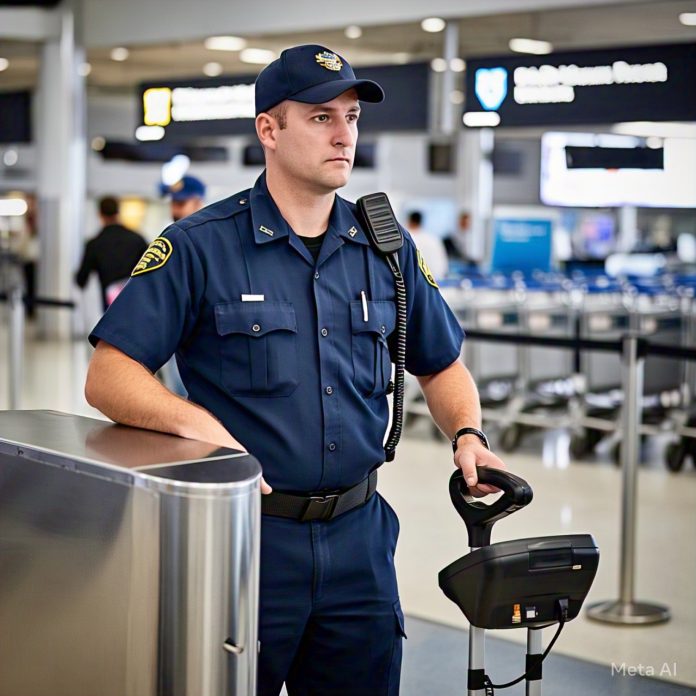Importance of Security in Airports
Airports are among the most sensitive and high-traffic public spaces in the world. With thousands of passengers traveling daily, security breaches can lead to catastrophic consequences. The need for thorough surveillance, controlled access, and immediate threat response makes the role of security personnel indispensable in this environment.
First Line of Defense Against Threats
Security guards serve as the frontline defense against terrorism, theft, and other criminal activity. Their presence alone can deter unlawful actions, but their training equips them to act swiftly and appropriately when threats arise, ensuring the safety of passengers and airport staff.
Managing Passenger Screening and Safety
Security personnel work hand-in-hand with airport screening technologies to verify passenger identities, check for prohibited items, and enforce safety regulations. They are trained to detect suspicious behavior and respond before any situation escalates, offering both security and peace of mind to travelers.
Monitoring Surveillance Systems
A significant part of a guard’s role is monitoring CCTV and other surveillance systems throughout the airport. This allows for a bird’s-eye view of operations, helping detect unusual patterns or unauthorized access. Their constant vigilance makes it possible to catch issues before they develop into larger problems.
Controlling Access to Restricted Areas
Airports have areas with restricted access, such as runways, maintenance rooms, and control towers. Security guards ensure that only authorized personnel enter these zones by verifying credentials and monitoring entry points. This strict access control is critical for operational integrity and safety.
Assisting in Emergency Situations
Security guards are among the first responders during emergencies such as fire, medical incidents, or security threats. Their training covers crowd control, emergency evacuation procedures, and collaboration with emergency services. This quick action is crucial for minimizing risk and saving lives.
Collaborating with Law Enforcement Agencies
Security guards often work alongside national and local law enforcement to enforce regulations and share intelligence. Their knowledge of the airport layout and daily operations makes them invaluable partners during investigations or coordinated security operations.
Ensuring Smooth Passenger Flow
Apart from surveillance, security personnel help manage passenger queues, assist with directions, and maintain order during peak hours. This function ensures efficiency in boarding, check-in, and security checks, contributing to a seamless travel experience for passengers.
Preventing Unauthorized Surveillance
In today’s digital world, information security is just as important as physical safety. Guards help protect sensitive data by monitoring suspicious individuals and preventing the use of unauthorized surveillance tools within airport premises.
Providing Visible Deterrence
Uniformed security guards provide a strong visual deterrent against criminal activities. Their consistent patrolling across terminals, entrances, and exits creates a sense of order and safety. This physical presence reassures passengers and dissuades potential wrongdoers.
Protecting Cargo and Baggage Handling Areas
Airports manage not only passengers but also cargo and logistics. Security guards protect baggage handling and cargo loading areas to prevent tampering, theft, or smuggling. Their vigilance ensures that both personal luggage and commercial shipments remain safe and intact.
Supporting Customer Service Roles
Many security guards are cross-trained in basic customer service. They assist lost passengers, offer directions, and answer general inquiries. Their friendly demeanor combined with strict enforcement of rules creates a secure yet welcoming environment.
Static Security for Consistent Coverage
For critical locations such as entrances and exits, a static security guard service provides uninterrupted supervision. This form of security involves guards posted at specific checkpoints, ensuring continuous monitoring and rapid response. Providers like this professional security company in Australia specialize in delivering such dedicated services.
Addressing Evolving Threats
Airport threats are constantly evolving, from cyberattacks to unmanned drones. Security guards receive updated training to tackle new challenges. Their adaptability ensures they stay prepared for modern threats without compromising the flow of airport operations.
Role in VIP and Executive Protection
Guards also handle VIP passenger protection, especially for high-profile individuals who require discreet yet effective safety measures. These include secured travel routes, controlled access, and private screening—all of which are managed without disrupting other passengers.
Enhancing Public Confidence in Air Travel
The visible presence and professionalism of airport security guards play a huge role in boosting public confidence. When travelers feel safe, they are more likely to travel frequently, supporting the economy and the aviation industry.
Choosing Reliable Airport Security Services
Airports should rely on reputable security providers with a track record of excellence. A dependable agency like this Australian security firm offers tailored services, experienced personnel, and comprehensive coverage—ideal for high-risk environments like airports.
Frequently Asked Questions (FAQs)
1. What training do airport security guards undergo?
They receive training in surveillance, emergency response, conflict resolution, and regulatory compliance to manage airport-specific threats.
2. Are airport security guards allowed to arrest passengers?
While they can detain suspicious individuals, arrests are typically handled by law enforcement. Guards secure the situation until authorities arrive.
3. How do guards help during flight delays or disruptions?
They manage crowd control, assist with rerouting, and prevent panic by providing timely updates and guiding passengers effectively.
4. What role do guards play in cargo security?
They monitor loading zones, check for unauthorized access, and ensure cargo remains secure during transit within airport grounds.
5. Do guards monitor cybersecurity threats?
Primarily, no. However, they work alongside cybersecurity teams to prevent physical breaches of sensitive tech infrastructure.
6. Are security guards active during nighttime hours?
Yes, airports operate 24/7, and so do the security teams. Guards provide round-the-clock monitoring and protection regardless of time.








